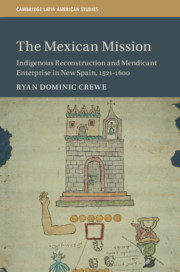Book contents
- The Mexican Mission
- Cambridge Latin American Studies
- The Mexican Mission
- Copyright page
- Dedication
- Contents
- Figures
- Maps
- Tables
- Acknowledgments
- Introduction
- Part I Conversion
- 1 The Burning Temple
- 2 Christening Colonialism
- Part II Construction
- Part III A Fraying Fabric
- Appendices
- Glossary
- Sources and Bibliography
- Index
- Cambridge Latin American Studies
2 - Christening Colonialism
The Politics of Conversion in Post-Conquest Mexico
from Part I - Conversion
Published online by Cambridge University Press: 13 June 2019
- The Mexican Mission
- Cambridge Latin American Studies
- The Mexican Mission
- Copyright page
- Dedication
- Contents
- Figures
- Maps
- Tables
- Acknowledgments
- Introduction
- Part I Conversion
- 1 The Burning Temple
- 2 Christening Colonialism
- Part II Construction
- Part III A Fraying Fabric
- Appendices
- Glossary
- Sources and Bibliography
- Index
- Cambridge Latin American Studies
Summary
This chapter presents a thorough re-examination of the so-called ‘Great Conversion,’ a period after the Spanish Conquest when millions of natives were baptized.Countering mendicant apologetic narratives that presented the process as a great spiritual turning, and more recent work that has limited itself to critique the apologists, this chapter demonstrates baptism was inextricably related to the social and political repercussions of conquest and demographic crisis.The chapter begins by examining the politics of indigenous adhesion to Christianity in the aftermath of conquest, highlighting the early alliances between rulers and missionaries. The chapter then examines the role of spiritual warfare and iconoclasm in mass-baptisms, which was a by-product of these early alliances.Amidst this violence, however, missionaries also extended a promise to protect indigenous communities from Spanish exploitation and enslavement of the native population.By the mid-1530s large-scale conversions resulted from an emerging consensus in indigenous communities that the mission provided them with a means to preserve their lives, property, and communities.Self-interest, spiritual warfare, and the search for sanctuary all drove this phenomenon.Through the waters of baptism, native communities began the process of remaking Mesoamerica in the 1530s.
Keywords
- Type
- Chapter
- Information
- The Mexican MissionIndigenous Reconstruction and Mendicant Enterprise in New Spain, 1521–1600, pp. 48 - 88Publisher: Cambridge University PressPrint publication year: 2019



